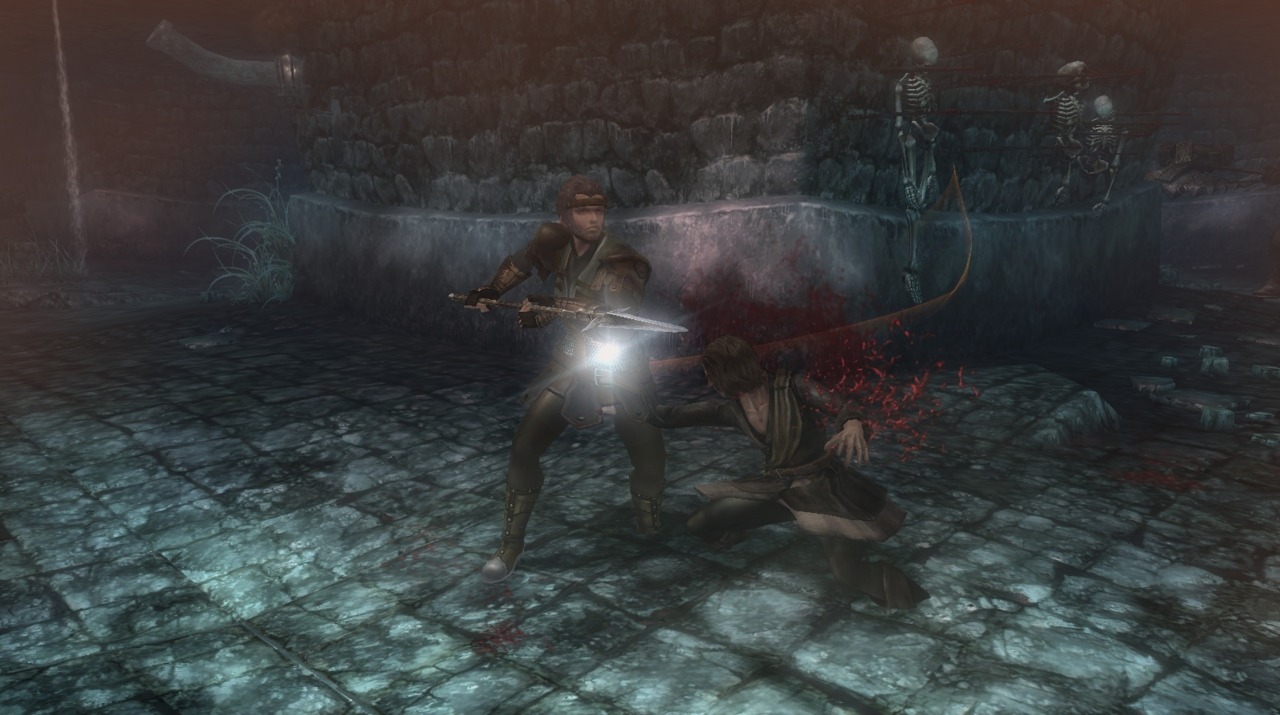Developer Gamepot's latest online venture doesn't sport the refinement of World of Warcraft, the large community of Guild Wars, or the political intrigue of EVE Online. In fact, to look at Wizardry Online, you may be fooled into thinking you've somehow tumbled backward in time to the late '90s, where the low-quality artwork and textures might have been more appropriate. The game has no trouble rehashing tired tropes for its own gain. But for all that it does wrong, it boasts a particular brand of scrappiness that keeps you plugging away, even when the danger of permadeath looms large.
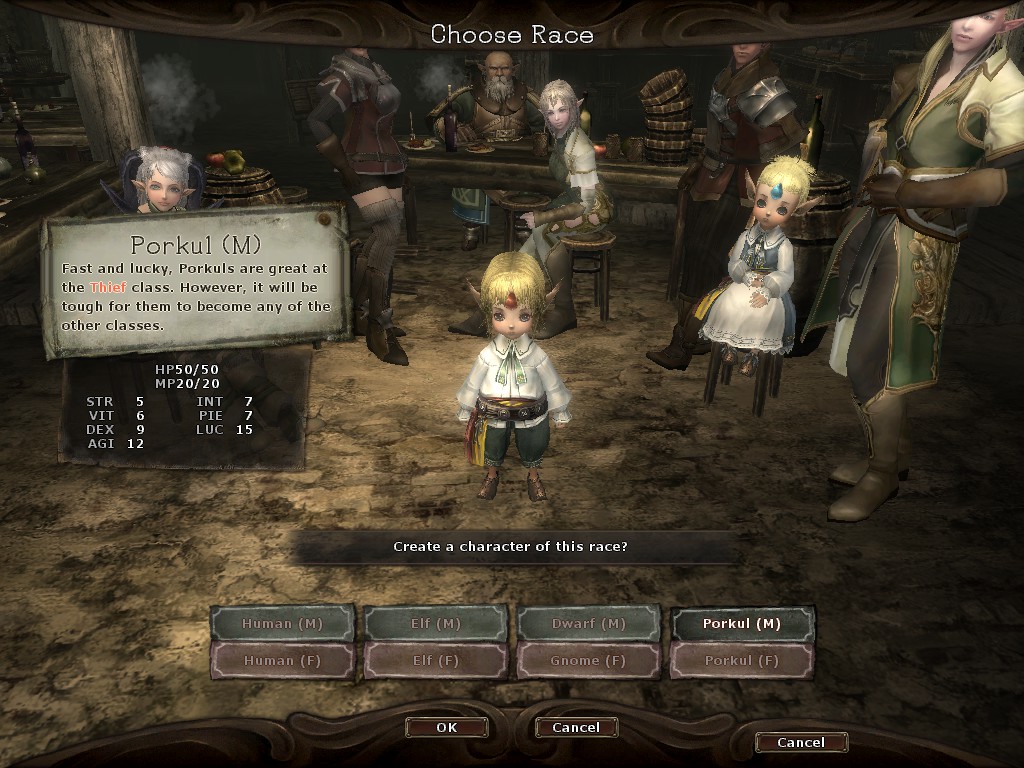
Wizardry Online is an austere fairy tale that falls somewhere between the healthy rigors of Final Fantasy XI and the masochism of Dark Souls. This dark fantasy doesn't stray far from the trappings associated with standard MMO design, but some interesting decisions keep it afloat, and there's no admission price to hinder you from fulfilling your curiosity. Unfortunately, none of this is evident in the initial hours. Perhaps that's why it seems that the aim of Wizardry Online, in keeping with the dungeon-crawling lore of the original Wizardry series, is to give you as challenging an experience as possible while still baiting you to continue.
After installation and several updates, the client greets you with some cinematic, Final Fantasy-esque fanfare. You're deposited into a seemingly never-ending online abyss after clicking "start." Once an arbitrary amount of time has passed, sometimes up to 15 minutes or more, you may be allowed onto the server. Using Alt + Tab to multitask while waiting to join a server isn't an option; you simply wait for the privilege of connecting. It's a rotten setup, especially when trying to join during what you would assume are the peak hours for play. It's also extremely frustrating to weather unpredictable wait times only to be booted from the server multiple times in one session, or to endure its lengthy load times, which Wizardry Online struggles with far too often.
A series of shoddy menus and options are waiting once you've made it server-side, and they're riddled with uninteresting color palettes and character models that do little to entice you. In fact, the game as a whole is devoid of any appealing graphics. After you're subjected to meandering lore and walls of text, it's time to assign a class. You choose from five different races: humans, dwarves, elves, gnomes, and the Tarutaru-like Porkul. The character creation screen shows off unusual character designs, such as the most feminine gnomes you'll ever see in your life and strangely unappealing elves; it's almost as if these races' established qualities swapped places.
After choosing an avatar and settling on a race, you need to select a class and alignment, although there isn't much choice to be had here. Alignments are nothing more than one additional stat to track and mean little in the grand scheme of things, so your class ultimately decides your fate. Gnomes fit the priest role, dwarves lead the charge as warriors, elves are powerful mages, and the Porkul are sneaky pickpockets. Humans are as vanilla as can be. A roll of the dice completes the package for your character's stats and can grant bonuses to races that happen to be awful at adapting to particular classes--say, a Porkul as a warrior. If you're just starting out, you can take chances when it comes to rerolling new characters, but seasoned veterans will want to carefully pick and choose, picking the best class for the race suited for the job. Still, it's unfortunate that races represent little more than aesthetic value; each character looks and plays practically the same.
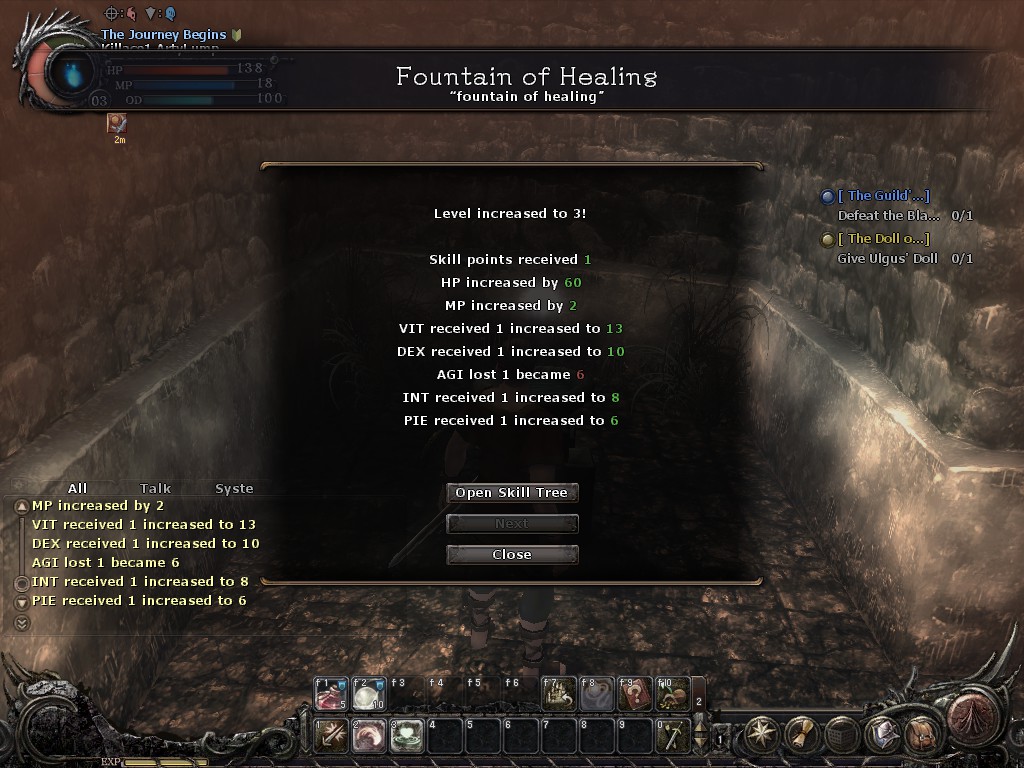
Once you're free to roam the world, you will want to find companions: this is a game you don't flourish in when flying solo. The in-game group finder goes a long way to ensure that you can always find a few fellow adventurers to complete the traditional tank-DPS-healer trifecta, which becomes invaluable when scouring the various dungeons. Quests and other tasks are assigned via hub worlds, and most of the action takes place deep in the heart of sewers and labyrinthine tunnels rife with puzzles. Considering you're spending time within smaller cramped spaces populated with high-level players, you're going to want someone watching your back at all times, and traveling alone is a great way to meet your permanent end much faster.
Combat is where you end up ferreting out the fun, which is often overshadowed by the messy UI and more brown graphics than a desert-themed first-person shooter. Active attack and defense moves are natural and much more kinetic than those of traditional MMO hotkey combat. Though each character class feels the same whether you're using magic or brute strength to conquer your enemies, having to exercise a bit of skill to land a hit on a rare enemy provides an extra level of immersion. You feel as though you have control to exert over this persistent world, and that's what ends up elevating this oft-confusing endeavor to a status beyond meager. As long as you can successfully sustain your health and mana (which do not regenerate), you're on your way to looting other players' corpses instead of littering each pathway with your hours of earned items and gold.
Leveling up is done in an unusual manner. There's no sudden "ding" while traveling; to level up, you must visit a fountain or an inn. Paying off an innkeeper determines your stat increases and decreases (yes, you can lose points when leveling up), and it's here that you ultimately decide your future as a hero. Weapons need repair, skill points are distributed here, and casual players are sorted from the hardcore.
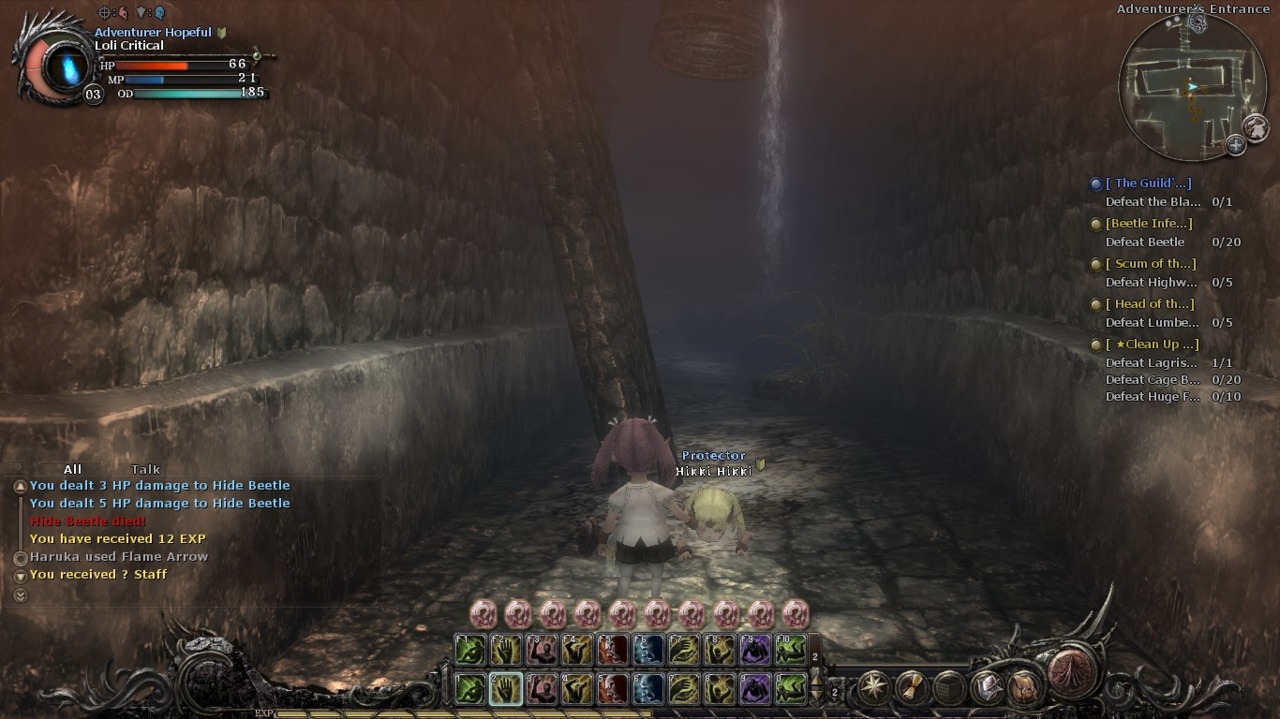
Then there's the constant threat of losing your life. Sound extreme? It's the driving force behind Wizardry Online and what keeps it interesting--or terrifying, depending on your viewpoint. Once you create a character, you're in danger of losing him or her forever. The possibility of losing a hero you've spent dozens of hours with is chilling, especially for players whose characters are composed of hard work and dedication.
Fortunately, there are several mechanisms in place to ensure that your first death is never your last. If you're venturing through the world as a newbie and you've fallen in battle, after death, you're immediately transported to the spirit realm, in which enemies are still free to roam and ravage you. You must wander around, defenseless, until you can reach the nearest shrine, where you can attempt to revive yourself. When you happen upon a special dark angel statue, there's a percentage that indicates your chances of being resurrected. If you die additional times, this percentage shrinks, until your only hope is to shell out Sony Station Cash (read: real money) or items from your inventory to tip the odds in your favor.
Sometimes, you can afford neither the real-world money nor the expendable items to be used as "life material." Unless your revival percentage is 100 percent, there's never a guarantee you'll see your character again. You can throw away cash and items for a simple chance at bringing your character back to life, but there is still no absolute guarantee of resurrection. While the cash shop is unobtrusive for the most part, asking players to pay for a revival that isn't even guaranteed is rather slimy. While you're never required to spend money to do so, if you develop any kind of attachment to your character, you will scramble to do anything necessary to recover so much lost work. Should you fail to resurrect your character, all experience, cash, and gear are sent off to float in the ether. And that's it. You're left to start from scratch.
Luckily, there are ways to ensure you're not forced to trudge through corpse runs and begrudgingly level from the beginning over and over again. In fact, your progress through the story and actual account progression are stored in your "soul," which is like a unique player ID that also unlocks a shared storage system to ensure that no matter how many times you die, eventually character creation and leveling become simpler.
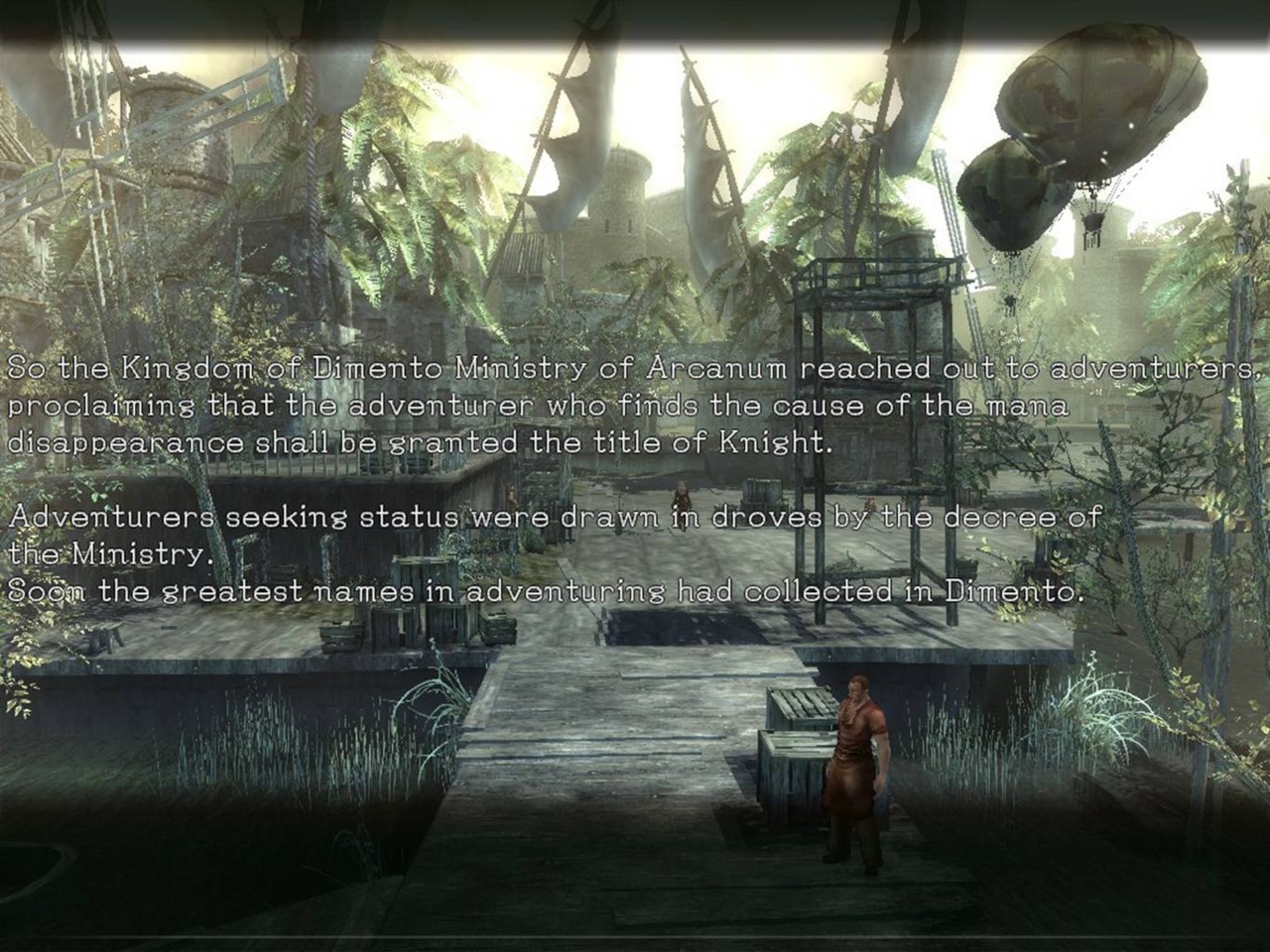
If permadeath isn't enough to scare you away, free-for-all PVP runs rampant here. It's not unusual to find a bounty on a particular player's head or find yourself the target of a jilted newbie's bloodlust. While there's the potential to fall victim to a frustrating gankfest (which you will, more than once), the offending players also run the risk of losing their characters.
The aspect of luck ties many of Wizardry Online's many random threads together: being lucky enough to find a group willing to work together, keeping your character alive, and staying afloat long enough to see the moments where it truly shines. Unfortunately, most of the time it's a lumbering beast of a game with interesting ideas cloaked behind layers of frustration that only dedicated players will surpass. It's the throwback to old-school role-playing that so many players clamor for, but Wizardry Online has more work to do if it hopes to swoop in and "save" players from games that have the gall to suffer from simplicity and user-friendliness.
'